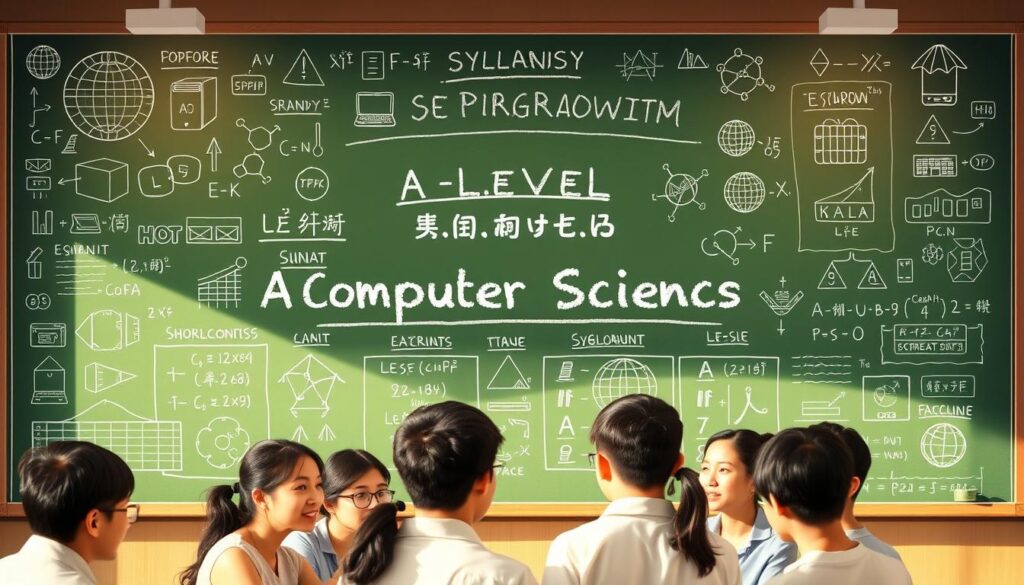Did you know that over 6 million students worldwide take Cambridge International A Level exams each year? Among these, A Level Computer Science stands out as a challenging yet rewarding subject. Mastering it requires more than just programming skills—it demands a deep understanding of fundamental concepts and practical applications.
At Getutor.com.hk, we specialize in connecting students with top private tutors who provide structured support and exam preparation strategies. Our goal is to help students overcome common struggles in theory and practical aspects of the course. With the right guidance, students can achieve outstanding results and unlock future opportunities in this high-demand field.
Our approach emphasizes the importance of revision resources and past paper practice from reputable sources like AQA and Oxbridge. We believe in empowering students with comprehensive knowledge and exam strategies to ensure their success.
Key Takeaways
- Expert guidance is crucial for overcoming challenges in A Level Computer Science.
- Structured support and exam preparation significantly improve results.
- Mastering fundamental concepts is key to achieving high grades.
- Revision resources and past paper practice are essential for exam success.
- Professional tutoring can provide personalized support for students.
Introduction to A Level Computer Science
Understanding A Level Computer Science is essential for students aiming to excel in technology and innovation. This course offers a deep dive into programming, algorithms, and data structures, preparing students for careers in tech. It’s not just about coding—it’s about solving real-world problems.
Overview of the Course and Its Importance
Globally, A Level Computer Science is recognized for its rigorous curriculum. It covers programming languages like Python and Java, along with data analysis and system design. This comprehensive approach ensures students gain both theoretical knowledge and practical skills.
In China, this course is particularly valued. It aligns with the country’s focus on technological advancement. Students develop critical thinking and problem-solving abilities, which are crucial for future innovations.
Understanding the Global and Local Context
With over 6 million students worldwide taking Cambridge International exams annually, A Level Computer Science stands out. It’s offered in over 190 countries, including China, where it’s integrated into the education system to nurture tech talent.
| Aspect | International | China |
|---|---|---|
| Curriculum Focus | Programming, algorithms, data structures | Same, with emphasis on innovation |
| Skills Developed | Critical thinking, problem-solving | Aligned with national tech goals |
| Relevance | High global demand | Supports China’s tech initiatives |
This structured approach ensures students are well-prepared for both global and local opportunities in tech.
Exploring the Syllabus: Key Units and Concepts
Understanding the structure of the A Level Computer Science syllabus is crucial for success. The course is divided into key units that build upon each other, providing a comprehensive foundation in both theory and practical skills. This section breaks down the core components and their significance in real-world applications.
Foundational Topics and Core Units
The syllabus begins with foundational topics such as data representation, which is essential for understanding how information is stored and processed in systems. This unit covers binary, hexadecimal, and data storage devices, laying the groundwork for more complex concepts later in the course.
| Topic | Description |
|---|---|
| Data Representation | Understanding binary, hexadecimal, and data storage devices. |
| Programming Constructs | Introduction to variables, data types, and control structures. |
| Algorithms | Study of sorting, searching, and graph algorithms. |
| System Fundamentals | Exploring system architecture and memory management. |

From Data Representation to Programming Constructs
Once the basics are mastered, students delve into programming constructs, learning how to write efficient code using variables, loops, and conditional statements. These constructs form the backbone of any programming language, enabling students to solve real-world problems creatively.
Advanced topics such as algorithms and system architecture are introduced, allowing students to understand how systems operate and how to optimize their code for performance. Practical projects and past paper questions help reinforce these concepts, preparing students for their exams and future careers in tech.
Deep Dive into a level computer science
Understanding the structure and assessment format of A Level Computer Science is key to achieving success. This section provides a detailed overview of the course components and exam requirements, helping students prepare effectively.
Course Structure and Exam Components
The A Level Computer Science curriculum is divided into two years. Year 12 focuses on foundational concepts, while Year 13 delves into advanced topics. The course is assessed through a combination of theoretical papers and practical exams.
Theoretical exams include Paper 1 (Theory Fundamentals) and Paper 3 (Advanced Theory). Paper 1 is 1 hour 30 minutes long, worth 75 marks, and constitutes 25% of the A Level. Paper 3, also 1 hour 30 minutes, is worth 75 marks and accounts for 25% of the A Level. Practical exams require students to demonstrate programming skills, algorithm development, and problem-solving abilities.
Practical exams assess students’ ability to write programs, create algorithms, and solve complex problems. These exams are crucial for developing skills in computational thinking and software development. The practical component ensures students can apply theoretical knowledge in real-world scenarios.
Each exam component contributes to the overall grade, emphasizing the importance of both theoretical understanding and practical application. With the right preparation and guidance, students can master the advanced components of the course and achieve outstanding results.
Mastering the Subject: Tips and Strategies
Achieving excellence in A Level Computer Science requires a strategic blend of theoretical understanding and practical application. Students who adopt a well-rounded approach often find the subject more manageable and rewarding. By focusing on effective study techniques and regular coding practice, learners can build a strong foundation and excel in this demanding field.
Effective Study Techniques for Theoretical and Practical Learning
To master A Level Computer Science, it’s essential to adopt a structured study routine. Start by creating a detailed study schedule that allocates specific time slots for both theoretical and practical work. Breaking tasks into smaller, manageable chunks can help students stay focused and avoid feeling overwhelmed.
Engaging in active learning is another effective strategy. This includes participating in discussions, solving past paper questions, and using flashcards to reinforce key concepts. Regular practice not only strengthens understanding but also builds confidence in tackling complex problems.
Integrating Coding Practice and Computational Thinking
Coding is a fundamental skill in A Level Computer Science. Regular practice helps students develop problem-solving abilities and improves their computational thinking. Focusing on algorithm design and program design ensures that students can create efficient and effective solutions to real-world problems.
Encourage learners to engage in hands-on coding exercises regularly. This practice helps build familiarity with programming constructs and enhances their ability to apply theoretical knowledge in practical scenarios. By combining coding practice with a sound design approach, students can develop innovative solutions that stand out.
At Getutor.com.hk, we believe that structured support and expert guidance are key to success. Our experienced tutors provide personalized learning strategies that cater to each student’s needs, helping them achieve their full potential in A Level Computer Science.
Common Challenges and Mistakes
Mastering A Level Computer Science can be challenging, especially when facing common mistakes. Students often struggle with assembly language and fundamental concepts. These errors can significantly impact performance, but understanding them is the first step toward improvement.
Identifying Frequent Errors in Problem-Solving and Code Writing
Exam papers reveal recurring mistakes. Many students misinterpret questions or fail to apply answers correctly. For instance, mixing program code with pseudocode is a frequent issue. Such errors can lead to lost marks, emphasizing the need for clear understanding and precise answers.
Addressing Misconceptions in Key Topics
Theoretical fundamentals are crucial. Errors in assembly language, such as incorrect syntax or logic, can hinder progress. Focused revision and practical exercises help address these issues. Regular practice with past papers clarifies question formats and highlights common pitfalls.
- Engage in regular coding exercises to build problem-solving skills.
- Use flashcards to reinforce key concepts and fundamentals.
- Participate in discussions and seek feedback from mentors or peers.
By addressing these challenges, students can improve their skills and achieve better results in A Level Computer Science.
Preparing for Exams: Comprehensive Guide
Exam preparation for A Level Computer Science requires a strategic approach to ensure success. Understanding the exam format and managing your time effectively can significantly impact your results. At Getutor.com.hk, we guide students and parents through structured preparation strategies to achieve their goals.
Understanding Paper Formats and Time Management
Each exam board (OCR, AQA, CIE) has a unique format. For instance, OCR’s Computer Systems account for 40% of the final mark, while AQA’s Paper 1 and Paper 2 each contribute 40%. Time management is crucial—every minute counts during the test. Practicing under timed conditions helps build confidence and efficiency.
| Exam Board | Final Mark Contribution |
|---|---|
| OCR | Computer Systems (40%), Algorithms & Programming (40%), Programming Project (20%) |
| AQA | Paper 1 (40%), Paper 2 (40%), Programming Project (20%) |
| CIE | Varies by topic (e.g., Information Representation, Communication) |
Revising with Past Papers, Flashcards, and Videos
Effective revision involves a mix of tools. Past papers familiarize students with question formats, while flashcards reinforce key concepts. Video tutorials offer visual learning, aiding in complex topic understanding. Mock exams and time-bound practices simulate real test conditions, helping students refine their strategies.

By organizing study schedules and utilizing these resources, students can master their exam preparation. Getutor.com.hk supports this journey with expert guidance, ensuring every student is well-prepared and confident.
Balancing Theory and Practical Work
Striking the right balance between theoretical knowledge and hands-on experience is vital for success in the A Level Computer Science course. A well-structured approach ensures that students grasp both the fundamentals and their practical applications. According to the syllabus from learnlearn.uk, this balance is key to preparing students for real-world challenges in the tech industry.
Crunching the Numbers: Theory vs. Practical Exercises
The course is designed to allocate time equally between theoretical studies and practical work. For instance, theoretical lectures span 12 hours, while practical sessions take up 20 hours. This structure helps students apply what they learn in a hands-on environment.
- Theoretical understanding lays the foundation for problem-solving.
- Practical exercises, such as coding and robotics, reinforce these concepts.
- A balanced approach ensures students develop both critical thinking and technical skills.
Challenges arise when integrating digital content with real-world projects. For example, managing time between theory and practice can be tricky. However, with a structured study routine, students can seamlessly combine both aspects.
By balancing theory and practice, students achieve holistic academic success. This approach not only enhances their understanding but also prepares them for future careers in technology.
Leveraging Revision Resources and Cheat Sheets
Effective revision is the cornerstone of success in A Level Computer Science. High-quality revision resources and well-structured cheat sheets can significantly enhance your study efficiency and exam performance.
Utilizing Unit-based Revision Material and Online Guides
Unit-based revision materials are tailored to specific areas of the syllabus, allowing focused study. For instance, resources on sorting algorithms and searching sorting techniques provide in-depth insights, helping students master these fundamental concepts. Online guides often include interactive examples and practice exercises, making complex topics more accessible.
Cheat Sheet for Quick Review of Critical Concepts
Cheat sheets are invaluable for quick concept reviews. They condense key information into an easy-to-digest format, perfect for last-minute revisions. For example, a cheat sheet on Python coding examples can rapidly refresh your memory on syntax and common functions. This approach is particularly useful for revising algorithm design and data structures.

By integrating these resources into your study routine, you can build a stronger foundation and improve exam readiness. At Getutor.com.hk, we emphasize the importance of structured revision strategies and expert support to help students achieve their academic goals.
Enhancing Skills through Real-world Projects
Engaging in real-world projects is a powerful way to deepen your understanding of computer science concepts. By applying classroom theory to practical coding exercises, students can gain hands-on experience that prepares them for future challenges.
Practical Coding Exercises and Software Development Tips
Real-world projects bridge the gap between theory and practice. For instance, developing a machine learning model or designing a secure database system allows students to apply concepts like artificial intelligence and data structures in meaningful ways.
- Artificial Intelligence and Security: Projects involving AI, such as facial recognition systems, help students understand complex algorithms and security measures.
- Machine and Database Applications: Building applications that interact with databases enhances programming proficiency and problem-solving skills.
- Programming Language Mastery: Working on projects that require specific programming languages ensures students grasp their nuances and best practices.
These exercises not only build confidence but also prepare students for industry-relevant challenges. At Getutor.com.hk, we encourage learners to explore such projects to enhance their skills and readiness for the tech workforce.
Boosting Performance with Private Tutoring
Private tutoring offers a personalized approach to learning, addressing each student’s unique challenges and optimizing academic performance. At Getutor.com.hk, we specialize in matching students with expert tutors who provide structured support and tailored study plans.
How a Private Tutor Can Address Struggles and Enhance Mastery
Expert tutors use specialized techniques to strengthen understanding. For instance, they help decipher complex concepts like machine code and networking fundamentals. These areas are crucial for developing a strong foundation in computer systems and data communication.
| Benefit | Details |
|---|---|
| Personalized Support | Customized study plans addressing specific academic needs. |
| Expert Techniques | Focus on machine code analysis and networking principles. |
| Proven Results | Students often see significant improvements in grades and confidence. |
Our tutors are dedicated to helping students achieve their goals. With a focus on both theoretical and practical skills, private tutoring creates a supportive environment for learning and growth.
Get Matched for Free at Getutor.com.hk/en/findtutor
At Getutor.com.hk, we believe every student deserves the right support. Our free matching service connects you with qualified tutors who understand your needs. This personalized approach ensures you receive the guidance necessary to excel in your studies.

Investing in private tutoring is a strategic step toward academic success. It provides the tools and confidence needed to overcome challenges and achieve outstanding results. Let us help you find the perfect tutor today.
Conclusion
In conclusion, mastering A Level Computer Science requires a well-rounded approach that combines theoretical knowledge, practical skills, and personalized support. Throughout this article, we’ve explored key study tips, common challenges, and effective strategies to help students excel.
A balanced approach, blending theory and practice, is essential for success. Revision resources, such as past papers and cheat sheets, play a vital role in reinforcing concepts and improving exam performance. Additionally, expert tutoring provides tailored guidance, addressing individual needs and enhancing overall understanding.
At Getutor.com.hk, we emphasize the importance of structured revision and personalized support. Our platform connects students with experienced tutors who offer customized study plans and expert techniques. By leveraging these resources, students can overcome challenges and achieve academic excellence.
Don’t hesitate to visit Getutor.com.hk/en/findtutor to find your perfect tutor. With continuous improvement and dedicated support, we help students unlock their full potential in A Level Computer Science.
Start your journey to success today!
FAQ
How can I best prepare for the A Level Computer Science exam?
Start by understanding the exam format and focus on time management. Regular practice with past papers and flashcards will help. Combine theoretical learning with practical coding exercises to ensure a well-rounded preparation.
What are the most challenging topics in A Level Computer Science?
Many students find sorting algorithms, machine code, and artificial intelligence challenging. Focus on breaking down complex concepts into smaller, manageable parts, and practice regularly with real-world examples.
How can I improve my programming skills for the course?
Dedicate time to coding practice using languages like Python or assembly language. Work on small projects and gradually move to more complex tasks. Regularly review your code to identify and fix errors.
What resources are best for revision?
Use unit-based revision guides, online tutorials, and past exam papers. Flashcards are great for quick concept reviews. For deeper understanding, explore educational videos and interactive coding platforms.
How can I balance theory and practical work effectively?
Allocate specific times for both theory and practical sessions. For every theory topic, try to apply it in a practical coding exercise. This balanced approach will enhance your understanding and retention of key concepts.
Can a private tutor help me improve my performance?
Yes, a private tutor can provide personalized guidance, addressing your specific struggles and enhancing your mastery of the subject. At Getutor.com.hk, we offer free matching services to find the right tutor for your needs.
What are the key differences between sorting algorithms and searching algorithms?
Sorting algorithms arrange data in a specific order, while searching algorithms locate specific data within a dataset. Both are fundamental in computer science and are widely used in programming and system design.
How important is understanding machine code in modern programming?
While high-level languages dominate modern programming, understanding machine code provides insights into how computers process information at a fundamental level. It’s essential for systems programming and artificial intelligence applications.
What role does networking play in A Level Computer Science?
Networking is a critical topic that covers how systems communicate. It includes understanding protocols, data transmission, and security measures. It’s vital for designing efficient and secure computer systems.
How can I stay motivated during my studies?
Set clear goals, celebrate small achievements, and remind yourself of the importance of the course. Engage with study groups and seek support when needed. Keeping a growth mindset will help you stay motivated and focused.


